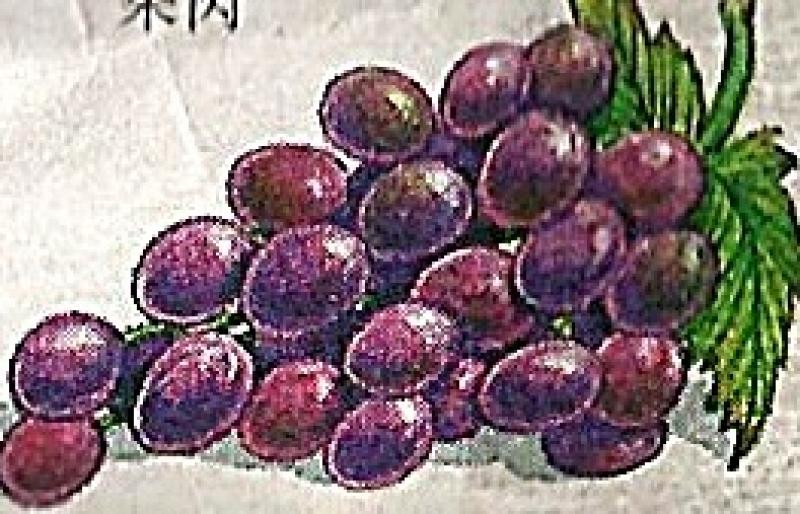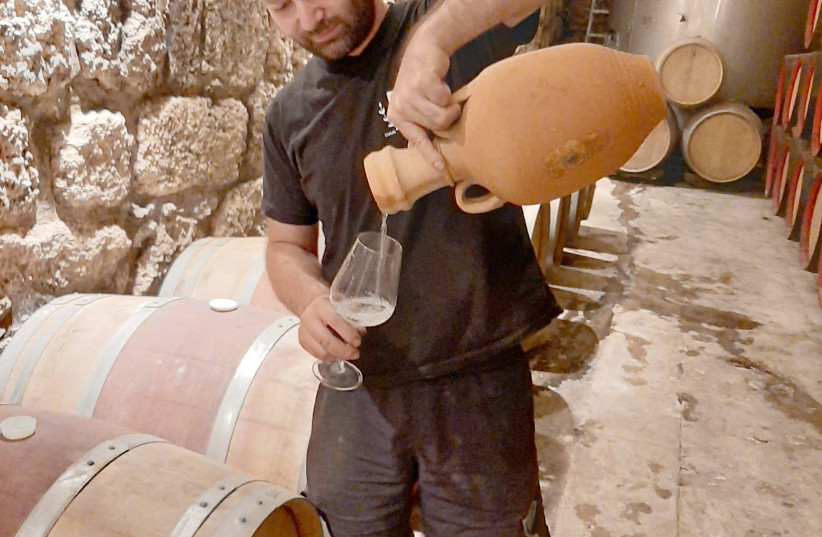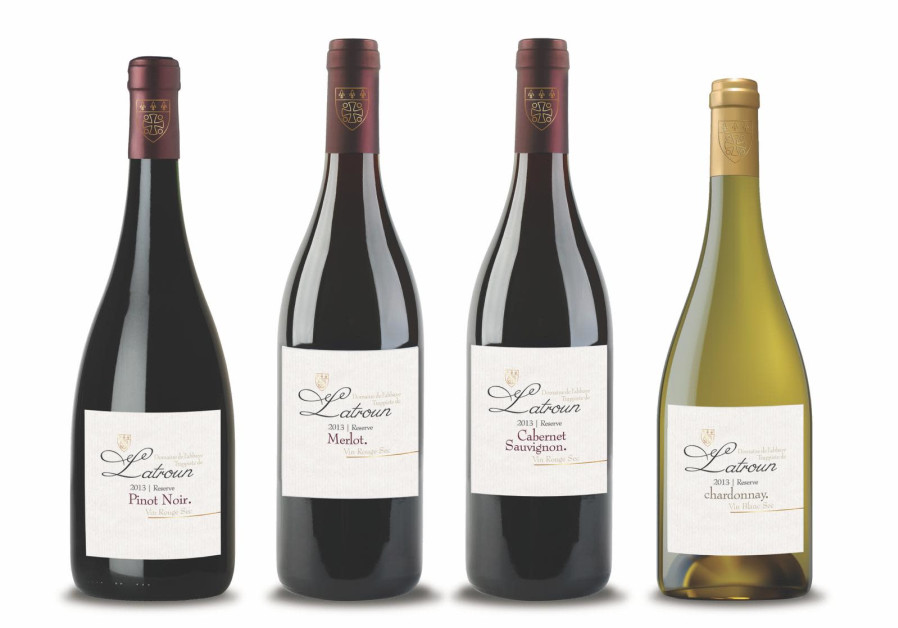Wine Talk: The Sound of Silence


Wine Talk: The Sound of Silence
The winery at Latrun monastery has been revitalized by Palestinian winemaker Adam Kassis.

Latroun's winemaker, Adam Kassis, pours his special arak.
(photo credit: ADAM MONTEFIORE)
Adam Kassis grew up with his stories of his grandmother making wine. This was common in Palestinian culture among the Christian community. Whilst the men would work, the women did the chores, grew the vegetables, looked after the animals and made the wine at home. The vines were grown domestically like a tree, trained to make a pergola, in order to give shade and provide grapes. The grapes could be eaten as an energy giving food, dried to make raisins, or reduced by boiling to produce dibs, a natural, sweet syrup. However, many would make wine, squeezing local grapes like Dabouki with their hands into a stone receptacle, which was something between a stone bowl and a trough. The wine would be sweet, last forever, and be enjoyed by the family.
When I met Nemi Ashkar of Ashkar Winery, he told me the same story of his mother and I felt privileged to taste his mother’s 20-year-old wine, filled into an old Grant’s Whisky bottle. Sweet, cloudy and oxidized, colored brown with orange tints, it would not have received a high score from Robert Parker, but it gave me goose bumps. It was like drinking history and receiving an insight into a culture that was as old as time, but new to me.
t the age of 11, Kassis was seconded to the winery at Latroun Monastery to help with the harvest. He has photos to show his participation and involvement as a “helper” for the winemaker. He was able to get dirty in the wine, was allowed to do everything and along with the blackened hands from handling dark red, ripe grapes, the experience engraved an indelible feeling at such a tender, young age that wine would be his career.
The Kassis family is from Bir Zeit, a Palestinian town north of Ramallah. His family has a vineyard, which is cared for by Adam’s father and brother. Wine and grapes were part of his past, present and future. When the time came, he made plans to go to Bordeaux to study oenology. He confided in the winemaker of Latroun, who was at that time from Chile, and was persuaded to change direction. “Come to Chile,” he was told. “You will learn everything you need to know… and it will be cheaper.”
He followed this advice, studied, learned and gained work experience at wineries before returning bushy-tailed and eager to put his newfound knowledge into action. He returned – where else – to Latroun in 2015 and became assistant winemaker. He also decided to make his own wine (under the Domaine Kassis label) as he was born to do, from his family vines, focusing on a field blend of Merlot and Cabernet Sauvignon and Chardonnay. He also makes a white, which is a Dabouki, blended with a little Hamdani and Jandali, grown near Hebron. (The best Dabouki I have tasted.)
He did a good job, so much so that he was invited to be the new winemaker of Domaine de Latroun in 2016. He arrived to find an old winery, but with all the equipment. The underground cellar is intriguing, with nooks and crannies, a few large old foudres (large barrels), disused rusting cement tanks and old musky oak barrels. However, among the old winery memorabilia were newish small, shiny stainless steel tanks and a few new oak barriques (225-liter French oak barrels.) A ray of hope amongst all the history.

Latroun produces wines from all the major French grape varieties (Photo Credit: Latroun Winery)
Latroun is mainly known in Israel as a junction off the Tel Aviv-Jerusalem highway, in the gentle curves of the Judean Foothills. Latroun Monastery was founded in 1890 by Trappist Monks, a silent order related to Cistercians, which dates back to the sixth century. It is a beautiful, serene building, surrounded by flowers and bushes in a blaze of color. It is a quiet, tranquil oasis amid the noise of day-to-day Israel.
The Trappist charter promotes earning a living by using one’s skills and being economically independent. Life is based on three fundamental principles, prayer, labor, and study and contemplation. The monks arrived to the Holy Land from France, immediately planted vineyards, orchards, olive groves and vegetables and made agriculture the basis of their work. They made wine and olive oil from the beginning, making this one of the oldest wineries in Israel.
They have 40 hectares of vineyards with over 20 grape varieties. Latroun was the first winery in Israel to plant varieties like Pinot Noir and Gewurztraminer. Domaine de Latroun produces and sells 200,000 bottles a year. Most are in their bright, nicely laid out wine shop, which is certainly better than the dusty, dirty, dark shop I remember visiting in the past. It is situated at the entrance to the monastery. Visitors may book tours to the monastery and they are encouraged to visit the shop to buy the wine, liqueurs, brandy, wine vinegar and souvenirs. However, visiting the winery is discouraged. It is a work area – a production factory not geared for receiving visitors or tourists.
Father Paul Saouma, the abbot of the Latroun Monastery, was always keen to give a focus to wine, believing it was not only important economically, but also part of daily life. Consumption with food was encouraged. Usually, winemakers were youngsters en-passant. One retrospectively became one of the wine greats. That was the Lebanese-born Mounir Saouma, who joined his uncle as winemaker in the 1990s. I remember his smile, friendliness and enthusiasm. We met occasionally at tastings. When he moved on, we had no idea to what heights he would achieve. He married Rotem, daughter of Avinoam and Michal of Barkanit Dairy, producers of some of Israel’s best goat cheeses. They moved to Burgundy and created the Lucien le Moine label, which won rave reviews and high scores at the very highest level. Then they bought property in Chateauneuf du Pape, and Saouma became a superstar. He is certainly the most famous winemaker ever to work at Latroun, we just did not appreciate it at the time.
Now, I have visited many wineries in Israel, including those in unlikely, even dangerous areas. However, I had never visited Latroun Winery. Of course, I had visited the shop and monastery, but they were always lacking information to satisfy even the mildest curiosity.
When I was recently given a contact name, a visit was arranged within 48 hours. I turned up at the monastery and was immediately redirected. The winery is situated off a dirt track in the outskirts of the monastery’s grounds, concealed from onlookers. A quad of old buildings includes an olive oil press, winery, cellars, storerooms and accommodation. When I walked in, two different elderly gentlemen, dressed in overalls, each separately looked at me in astonishment as though I was an alien from Mars, before politely inquiring what I was doing and where I was going. Someone new was almost cause for alarm.
As I arrived at the unsung winery building, a nun dressed in a habit was squatting in an undignified pose, crushing olives in a small crusher. It was explained they provide the service for individual growers. Then I saw Kassis. He was young, confident, friendly, yet also ambitious, passionate and knowledgeable. He was short-haired with a well-trimmed beard, and dapper in a blue Latroun Winery polo shirt and blue shorts. He gave me the tour of the rabbit warren winery, mostly underground. It was a time warp of an old winery, but with a few modern pieces of equipment to show a new professionalism.
I tasted some wines from the barrel and white wines from the tank. These were good and showed promise. Certainly, they were better than what I had tasted from Latroun in years gone by. He then disappeared, and returned cradling a clay jar with love and care, as if carrying a newly born baby. This was his arak, which really was his baby. Distilled three times and made from grapes as it should be (most commercial Israeli araks are distilled from molasses), it had a delicate anise nose, and was not in your face like many cheaper araks. The clay jar aging gave it a smoothness and it went down beautifully. Watch out for this when it is bottled. We tasted the brandy, which they are very proud of. Finally, I was given the privilege of tasting the Latroun Elixir, a liqueur reminiscent of Benedictine made from a secret recipe of spices and herbs. It is a specialty of the monks, which was not my cup of tea, but it would settle the most topsy-turvy stomach.
After returning home, I tasted the 2018 Chardonnay, which was a little flat, certainly OK, but no more than that. I preferred the Sauvignon Blanc I tasted from tank. Aromatic with good acidity. I also tasted the Reserve Syrah 2017, which was full of sweet juicy fruit. A far cry from the Latroun of old.
Latroun Monastery reminds us of the crucial role of the Church in maintaining and delineating the great wine regions of Europe during the Middle Ages. Monasteries and wine have always been partners throughout history. Domaine de Latroun is part of the region’s wine history, and I believe better days are here again. Kassis is a young, knowledgeable Palestinian winemaker, and I shall be following his progress with great interest.
The writer has advanced Israeli wine for over 30 years and is referred to as “the English voice of Israeli wine.”
www.adammontefiore.com



If you are a wine lover, his arak could be a winner.
At $75 a bottle it's too steep for me.
How did you know that? According to the article it hasn't been bottled yet.
I googled it to see if it's exported. There are 3 bottles for sale @ 75. You don't have to believe me Buzz, look it up Latroun yourself.
I DID believe you, but I wonder if you googled Latroun Arak or Domain Kassis Arak. From the article:
and
I assumed his Domain Kassis Arak has not yet been bottled and therefore not yet priced. That is why I asked how you knew how much it was selling for.
Well since there's pictures of the bottles in the seed, it seems logical that's been bottled.
Yes, Latroun arak has been bottled, and they are so pictured. But that is not the wine I was referring to when I said "his arak", and as I posted above your last comment he was selling HIS wines under HIS domaine label.
Again:
NOT under the Latroun label. Please take note that the bottles that are pictured in the article are wines under the "Latroun" label.
As it happens, following your hint, I looked up the price of arak wines and all the ones I saw were at least around $70 with many over $130. I could not find Domaine Kassis arak, but that's possible since one might realize it hasn't been bottled yet.
I think I have to agree with my friend Krishna when he is critical of members who make comments when they have not even read the article, and even if they have read it, they don't understand what they have read. If I were caught in a situation like that I would at least have admitted my error, but then perhaps I differ from others.
I am a red wine guy. One thing that I would love to find is a good tasting organic red. Now that would be cool!
Yeah, I always preferred red myself, but I almost never drink alcoholic beverages any more - because I discovered that it causes me to develop gout.
Good reason! Sorry to hear that.
I'm a red person, too. I agree finding a good organic wine is a thing for me, too. Also, one that doesn't have sulfites. I think that is what is giving Buzz the gout.
It is very difficult finding an organic red that tastes good. I am working on it but so far I am not encouraged.
I used to drink wine quite often, almost always with a meal, and it never gave me a problem. However, being invited often to banquets in China, and drinking their "moutai" which is like drinking liquid fire, makes vodka seem like lemonade in comparison, at the many banquets I was invited to where everyone is expected to toast everyone else with it, led, I think, to my developing gout. The first time I drank it, not knowing how powerful it was, I had to be almost carried out of the restaurant.
Collecting guide: Moutai — China’s ‘national liquor’
The one thing this article didn't talk about was how strong it is.
I think Beringer Napa produces organic Cabernet Sauvignon. They don't produce a bad wine. Also one of the most beautiful places you'll ever see.
Thanks Dulay, I will investigate!
I was there and you are right! It is beautiful. They have a great Cab.
They used to have a beautiful white burgundy, I drank it all. Bought it by the case.
Wine always gave me a massive hangover. Especially white wine.
Surely that depends on how much you drink. A glass of wine with dinner should not do that.
I can never just have one. Haha
LOL. Will power, Ender, use will power.
I can't drink wine. I have chemical allergies, and the aging ingredients in most wines gives me excruciating headaches after just a few sips. It also makes me dizzy and blurred vision.
I do like the taste of some wines that I have tried a sip of, but, the consequences are just too painful to indulge.
Try a certified organic wine.
I have, as I really did want to try a nice glass of wine. But, even the organic wine has the same effect. Not sure why, but, could be the aging ingredients are just not listed. Wines can't really age naturally in a short period of time, that is why the aging ingredients are added to make the wines age faster for larger production.
The key, I think, is to have organic grapes but also be certified organic (ensure the wine states that it has no sulfites). And if it is difficult to find a certified organic wine then you can also try a conventional wine that is sulfite free. From what you just said, I suspect it is the sulfites more than anything else that is affecting you.
Thanks TiG. You may be right about the sulfites. I will check to see if I can find a wine that is sulfite free and try it.
Thank you for the heads up.
Hopefully this will result in 'cheers!' (since you like the taste of wine).
Highland Manor Winery - Jamestown Tenn. - Muscadine wine …………… GREAT !
Main Street Winery - Arcade N.Y. - Raspberry Peach …………. GREAT !
Chatham Winery - Chatham Mass. - Chatham Blush Vin Rose ……………… GREAT !